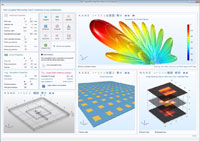 COMSOL, the leading provider of multiphysics modeling, simulation, and application design software, has announced support for app development that furthers work toward 5G and the IoT. Several of these application examples will be introduced at the International Microwave Symposium (IMS) 2016. The COMSOL Multiphysics® software and its Application Builder provides simulation experts with the tools needed to turn their detailed physics and mathematical models into easy-to-use simulation apps for use by everyone in their organization and beyond. “We wanted to show designers how easy it is to build a customized easy-to-use interface based on their detailed model in order to let anyone in product development test different operating conditions and configurations,” said Jiyoun Munn, technical product manager of the RF Module at COMSOL.
COMSOL, the leading provider of multiphysics modeling, simulation, and application design software, has announced support for app development that furthers work toward 5G and the IoT. Several of these application examples will be introduced at the International Microwave Symposium (IMS) 2016. The COMSOL Multiphysics® software and its Application Builder provides simulation experts with the tools needed to turn their detailed physics and mathematical models into easy-to-use simulation apps for use by everyone in their organization and beyond. “We wanted to show designers how easy it is to build a customized easy-to-use interface based on their detailed model in order to let anyone in product development test different operating conditions and configurations,” said Jiyoun Munn, technical product manager of the RF Module at COMSOL.
As we work toward 5G and the Internet of Things (IoT), designers of RF and microwave devices will benefit from multiphysics modeling and simulation of antennas and circuits, not limited to RF and microwaves but extending to the range of millimeter waves and Terahertz. The latest release of the RF Module in COMSOL Multiphysics® comes with several application examples that allow COMSOL® software users to run, inspect, and use the apps – allowing them to see how straightforward it is to turn their model into a custom application.
Of interest to antenna designers is the Slot-Coupled Microstrip Patch Antenna Array Synthesizer demo app, pictured here. It simulates an FEM model of a device that is fabricated on a multilayered low temperature co-fired ceramic (LTCC) substrate, and extends the results to the user-specified array configuration.
The results include S-parameter, electric field distribution on each layer, far-field radiation pattern of the antenna array, and its directivity. The far-field radiation pattern is calculated by multiplying the array factor and the single antenna radiation pattern to perform an efficient far-field analysis without simulating a complicated full array model, allowing the app user to independently obtain their simulation results within seconds. “Given how competitive the race is to deliver the best 5G solutions, building simulation apps for an entire team will allow designers to share their expertise easily and free up resources to develop new concepts,” adds Munn.
Using COMSOL Multiphysics®, microwave and RF designers can couple electromagnetic simulations with heat transfer, structural mechanics, fluid flow, and other physical phenomena, allowing them to represent coupled physics effects as they would occur in the real world. That means being able to accurately investigate designs and fully benefit from the virtual prototyping capabilities COMSOL® offers.
The upcoming version of the RF Module, which is scheduled to be released shortly after the International Microwave Symposium (IMS) 2016, strengthens its design and test feasibility by including new tutorial models such as a log-periodic antenna for EMI/EMC Testing, and a signal integrity (SI) and time-domain reflectometry (TDR) analysis of adjacent microstrip lines. The Application Libraries also include detailed model examples guiding users to perform very fast prototyping with high accuracy through reduced-order model simulation techniques based on asymptotic waveform evaluation (AWE) and frequency-domain modal methods.
If you would like to learn more about COMSOL® and its simulation apps capabilities for your 5G and IoT solutions please connect with Natalia Switala, natalia@comsol.com, to schedule an interview with Jiyoun Munn at IMS 2016, 22 - 27 May 2016, San Francisco, CA, USA.
